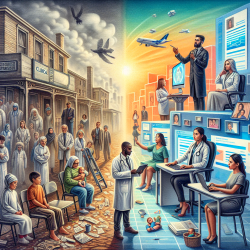Telemental health via videoconferencing (TMH-V) is revolutionizing the way mental health services are delivered. But how do providers feel about this shift? A recent systematic review titled A systematic review of providers’ attitudes toward telemental health via videoconferencing offers valuable insights.
Overall, providers have a positive attitude towards TMH-V, despite some challenges. Here are key takeaways from the review:
- Performance Expectancy: Providers believe TMH-V is effective and useful, particularly for increasing access to care and saving time and money.
- Effort Expectancy: Many providers find TMH-V easy to use, though some report technological issues.
- Social Influence: Support from organizational leadership can positively impact providers' attitudes towards TMH-V.
- Facilitating Conditions: Strong technical support and infrastructure are crucial for successful TMH-V implementation.
However, there are some drawbacks:
- Technological Problems: Issues with audio and video quality can disrupt sessions.
- Increased Workload: Some providers feel TMH-V adds to their workload due to equipment setup and scheduling complexities.
- Impersonal Feel: Difficulty in reading nonverbal cues and maintaining eye contact can make TMH-V feel less personal.
Interestingly, providers with more experience using TMH-V tend to have more positive attitudes. This suggests that familiarity with the technology can mitigate some of the perceived drawbacks. Moreover, training and technical support play a significant role in enhancing providers' confidence and competence in using TMH-V.
For practitioners looking to improve their TMH-V skills, here are some practical tips:
- Seek out training opportunities to become more comfortable with the technology.
- Ensure you have reliable technical support to address any issues promptly.
- Experiment with different camera angles and lighting to improve the quality of your video sessions.
- Develop strategies to address common challenges, such as maintaining a low threshold for inquiring about recent substance use to compensate for the difficulty in detecting intoxication remotely.
As the field of telemental health continues to evolve, staying informed and adaptable is key. Embrace the benefits of TMH-V while being prepared to navigate its challenges. By doing so, you can provide effective and accessible care to your patients, regardless of their location.
To read the original research paper, please follow this link: A systematic review of providers’ attitudes toward telemental health via videoconferencing.










